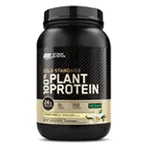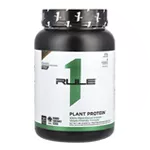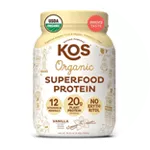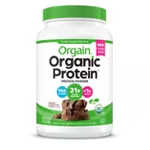Plant-based protein powders are a clean, sustainable way to fuel your fitness journey. Packed with nutrients and free from animal products, they help build muscle, support recovery, and suit various dietary needs. This guide highlights the 13 best plant-based protein powders to power your workouts and support a healthy lifestyle.
Plant-based protein powders have become essential for fitness enthusiasts seeking to enhance their workouts with sustainable nutrition. These supplements offer a variety of protein sources suitable for diverse dietary preferences. In this article, we explore the history, types, benefits, and workout advantages of plant-based protein powders, followed by a curated list of 13 top options to consider.
Table of Contents
ToggleHistory of Plant Based Protein Powders
The rise of plant-based protein powders aligns with increasing awareness of health, environmental, and ethical considerations. Initially, protein supplements were predominantly whey-based, catering to those seeking muscle growth and recovery. However, as veganism and lactose intolerance became more recognized, the demand for plant-based alternatives grew. Early plant-based proteins, often derived from soy, paved the way for a broader spectrum of sources, leading to the diverse market we see today.
Types of Plant Based Protein Powders
- Pea Protein: Extracted from yellow split peas, it’s rich in essential amino acids and easily digestible.
- Brown Rice Protein: A hypoallergenic option that’s gentle on the stomach, though it may lack some essential amino acids.
- Hemp Protein: Contains omega-3 fatty acids and fiber, offering a slightly nutty flavor.
- Soy Protein: A complete protein source but may be a concern for those with soy allergies or sensitivities.
- Pumpkin Seed Protein: Offers a robust nutrient profile, including magnesium and zinc.
- Blended Proteins: Combine various plant sources to provide a complete amino acid profile.
Benefits of Plant Based Protein Powders
- Digestibility: Often easier on the digestive system, reducing bloating and discomfort.
- Nutrient-Rich: Packed with vitamins, minerals, and antioxidants beneficial for overall health.
- Allergen-Friendly: Suitable for those with dairy or gluten intolerances.
- Sustainable: Lower environmental impact compared to animal-based proteins.
How Plant Based Protein Powders Enhance Workouts
Incorporating plant-based protein powders into your fitness regimen can aid muscle repair, promote muscle growth, and improve recovery times. They provide the necessary amino acids required for protein synthesis, ensuring your muscles receive adequate nutrition post-exercise. Additionally, the fiber content in many plant proteins supports digestive health, contributing to overall well-being.
13 Best Plant Based Protein Powders to Power Your Workouts
1. ACTIVE Vegan Protein 4LB
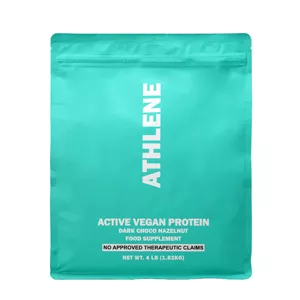
ACTIVE Vegan Protein is a plant-based protein powder designed to support muscle recovery and growth. It offers a blend of protein sources to provide a complete amino acid profile, catering to those seeking a vegan-friendly supplement for their fitness regimen.
Pros:
- Provides a complete amino acid profile.
- Suitable for vegans and vegetarians.
- Large 4-pound container offers extended use.
Cons:
- Flavor options may be limited.
- May not be readily available in all regions.
2. JML SammyJ Nutriessentials Plant-Based Protein Powder
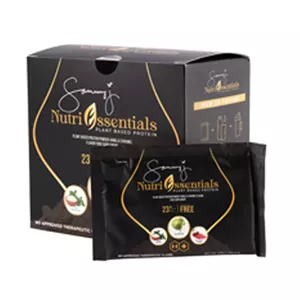
Sammy J NutriEssentials Protein is a premium, plant-based protein supplement designed for adults, particularly beneficial for those who may have trouble digesting dairy. It’s an excellent choice for active individuals, fitness enthusiasts, or anyone looking to accelerate recovery from strenuous workouts.
Pros:
- High protein content suitable for muscle repair.
- Low in calories, aiding in weight management.
- Supports metabolism and overall health.
Cons:
- Limited flavor variety.
- Availability may be restricted to certain regions.
3. KOS Organic Vanilla Shake Plant Protein
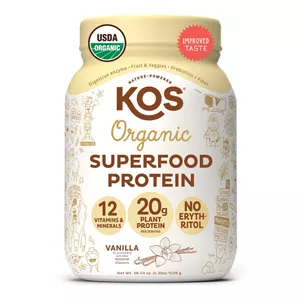
Best Overall Quality
KOS Organic Plant Protein Powder is a vegan protein powder that combines a blend of pea, flaxseed, quinoa, pumpkin seed, and chia seed proteins. It’s USDA Organic certified, low in carbs, and free from soy and dairy, making it a suitable meal replacement for those following a keto diet.
Pros:
- USDA Organic is certified with a blend of five plant proteins.
- Low in carbohydrates, suitable for keto diets.
- Free from soy and dairy, accommodating various dietary restrictions.
Cons:
- Contains erythritol, which may cause digestive discomfort in some individuals.
- Flavor may not appeal to all users.
4. NFS Plant Protein Vegan Organic Pea Protein
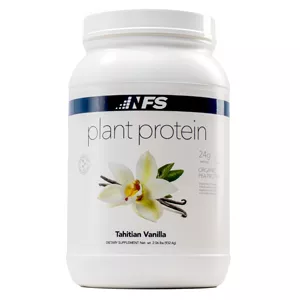
NFS Plant Protein offers a vegan organic pea protein powder, providing a clean protein source for those seeking plant-based nutrition. It’s designed to support muscle growth and recovery, suitable for individuals with dietary restrictions.
Pros:
- Organic pea protein offers a clean protein source.
- Suitable for vegans and individuals with dairy allergies.
- Supports muscle growth and recovery.
Cons:
- May have a gritty texture.
- Limited flavor options.
5. ON Gold Standard 100% Plant Protein Rich Chocolate Fudge
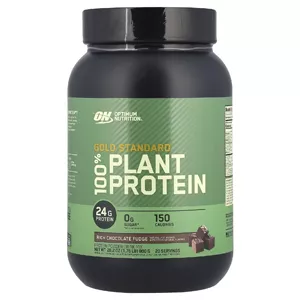
ON Gold Standard 100% Plant Protein Rich Chocolate Fudge is a plant-based protein powder offering 24 grams of protein per serving. It’s designed to support muscle recovery and growth, with a rich chocolate fudge flavor to enhance taste.
Pros:
- High protein content per serving.
- Delicious chocolate fudge flavor.
- Supports muscle recovery and growth.
Cons:
- Contains added sugars.
- May not be suitable for those avoiding sweeteners.
6. Optimum Nutrition Gold Standard 100% Plant Protein
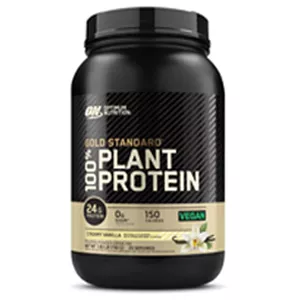
Shopee’s Choice
Optimum Nutrition’s Gold Standard 100% Plant Protein offers 24 grams of protein per serving from a blend of organic pea, brown rice, and sacha inchi proteins. It’s designed to support muscle recovery and is free from artificial flavors and sweeteners.
Pros:
- High protein content from a blend of plant sources.
- Free from artificial flavors and sweeteners.
- Supports muscle recovery.
Cons:
- Limited flavor options.
- Some users may find it less palatable.
7. Orgain Organic Protein Powder
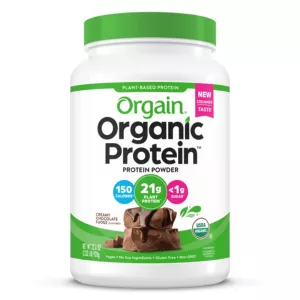
Most Affordable
Orgain Organic Protein Powder is a plant-based protein supplement offering 21 grams of protein per serving. It’s USDA Organic certified, non-GMO, and free from soy and gluten, making it suitable for various dietary needs.
Pros:
- USDA Organic certified and non-GMO.
- Free from soy and gluten.
- Provides 21 grams of protein per serving.
Cons:
- Some users report a chalky texture.
- Flavor may not suit everyone’s taste.
8. Rule One R1 Plant Based Vegan Proteins
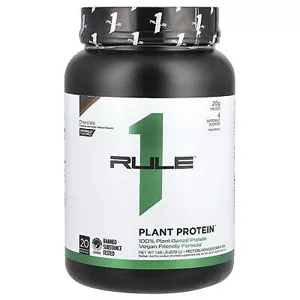
Best All-Natural Formula
Rule One’s R1 Plant Based Vegan Protein provides 20 grams of protein per serving from pea, sunflower seed, and watermelon seed proteins. It’s free from artificial colors, flavors, and sweeteners, catering to those seeking a clean protein source.
Pros:
- Blend of diverse plant proteins.
- Free from artificial additives.
- Suitable for vegans.
Cons:
- May have a grainy texture.
- Flavor options are limited.
9. RYSE Loaded Plant Protein
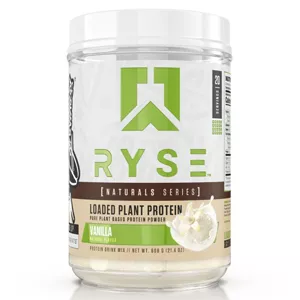
RYSE Loaded Plant Protein offers 20 grams of protein per serving, derived from a blend of pea, chickpea, and barley rice proteins. This combination ensures a complete amino acid profile, supporting muscle recovery and growth. The formula includes prebiotic fiber for digestive health and medium-chain triglycerides (goMCT®) for natural energy support. Notably, it contains zero artificial flavors, colors, or sweeteners, aligning with clean nutrition principles.
Pros:
- Provides a complete amino acid profile.
- Includes prebiotic fiber and MCTs for added health benefits.
- Free from artificial additives.
Cons:
- Limited flavor options.
10. San Nutrition Rawfusion Plant Protein
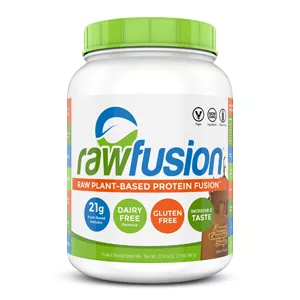
San Nutrition’s Rawfusion Plant Protein delivers 21 grams of protein per serving from pea protein isolate, brown rice sprouted, and artichoke protein. It’s designed to provide a complete amino acid profile, suitable for vegans and vegetarians. The formula is free from dairy, soy, and animal products, catering to various dietary restrictions.
Pros:
- High protein content with a complete amino acid profile.
- Free from common allergens like dairy and soy.
- Suitable for vegans and vegetarians.
Cons:
- Some users may find the taste less appealing.
- May have a slightly grainy texture.
11. Sunwarrior Warrior Blend Organic Plant Protein
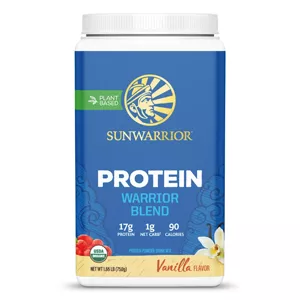
Sunwarrior’s Warrior Blend combines pea protein, hemp protein, and goji berries, offering 19 grams of protein per serving. This organic, plant-based protein powder is free from soy, gluten, and dairy, making it suitable for various dietary needs. It’s designed to support muscle recovery and promote overall health.
Pros:
- Organic and free from common allergens.
- Contains a blend of protein sources for a complete amino acid profile.
- Includes goji berries, adding antioxidants.
Cons:
- Protein content per serving is slightly lower compared to some competitors.
- Some users may not prefer the natural flavor.
12. UCAN Energy Plant Protein Powder
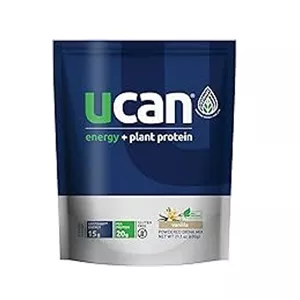
UCAN Energy Plant Protein Powder combines pea protein with their proprietary SuperStarch®, providing a sustained energy release. Each serving delivers 20 grams of protein, designed to support muscle recovery and maintain energy levels. It’s free from added sugars and artificial ingredients, catering to health-conscious individuals.
Pros:
- Provides sustained energy release with SuperStarch®.
- High protein content per serving.
- Free from added sugars and artificial ingredients.
Cons:
- Limited flavor options.
- May not be suitable for those seeking a traditional protein powder without added energy components.
13. Wheyl Nutrition POD Plant-Based Whey Protein
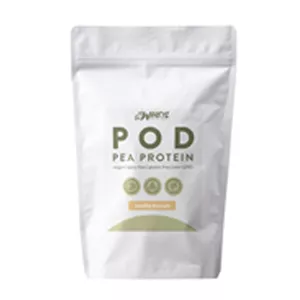
Wheyl Nutrition’s POD Plant-Based Whey Protein offers a unique blend of plant-based proteins designed to mimic the amino acid profile of whey protein. Each serving provides a substantial amount of protein, supporting muscle growth and recovery. It’s formulated to be easily digestible and free from common allergens, catering to a wide range of dietary preferences.
Pros:
- Mimics the amino acid profile of whey protein.
- Easily digestible and free from common allergens.
- Supports muscle growth and recovery effectively.
Cons:
- May have a different taste compared to traditional whey protein.
- Availability may be limited in certain regions.
How to Choose the Right Plant Based Protein Powder
Picking the best plant-based protein powder depends on your health goals, taste preferences, and dietary needs. Here are a few things to consider:
- Protein Source: Look for powders with a complete amino acid profile. Blended sources like pea, brown rice, and hemp offer better coverage than single sources.
- Nutritional Content: Check for protein grams per serving, sugar content, fiber, and added nutrients like B12 or iron.
- Dietary Restrictions: If you have food sensitivities, opt for powders that are certified gluten-free, soy-free, or free from artificial additives.
- Flavor and Mixability: Choose a flavor you’ll enjoy daily and read reviews to see if it mixes well in water, milk, or smoothies.
- Certifications: Look for third-party testing or labels like USDA Organic, Non-GMO, and Informed-Sport if you’re an athlete.
Safety Usage of Plant-Based Protein Powders
While plant-based protein powders are generally safe, here are a few best practices to ensure you’re using them effectively and safely:
- Stick to Recommended Serving Sizes: Too much protein can strain the kidneys, especially if water intake is low.
- Watch for Allergens: Even plant-based products can contain allergens like soy, nuts, or gluten. Always read labels.
- Avoid Excess Additives: Steer clear of powders with artificial sweeteners, dyes, or excessive sugar alcohols.
- Hydrate Well: Protein requires water for digestion and metabolic processing. Drink enough fluids throughout the day.
- Consult with a Doctor: If you have existing health conditions, especially kidney or liver concerns, check with a medical professional before regular use.
Personal Insights and Recommendations
I started using plant-based protein after switching to a dairy-free diet. At first, I was skeptical—worried about the taste and whether it would really help with recovery. But after trying a few types and finding the right one, I felt less bloated and noticed better digestion. What really surprised me was how much more energy I had during workouts and how much easier it was to stick to a clean eating routine. It took a bit of trial and error, but once I found what worked for me, I never looked back. It’s now part of my daily routine.
10 Frequently Asked Questions (FAQs)
1. Can plant-based protein powder build muscle?
Yes, when combined with resistance training and adequate calorie intake, plant-based proteins support muscle growth just like animal-based ones.
2. Are plant-based protein powders complete proteins?
Some are (like soy or blended powders), but many single-source proteins lack one or more essential amino acids.
3. Can I use plant protein powder as a meal replacement?
Yes, if combined with healthy fats, fiber, and carbs, it can make a balanced meal replacement shake.
4. Is it safe to take protein powder every day?
Yes, most people can safely consume it daily, provided total protein intake stays within recommended limits.
5. Do plant-based powders taste bad?
Some have earthy or gritty textures, but many newer formulas taste great—especially when blended into smoothies.
6. Can kids take plant-based protein powder?
Not unless advised by a pediatrician. It’s best to get kids’ protein from whole foods.
7. Will plant protein cause bloating?
It can, especially if it contains lots of fiber or sugar alcohol. Start with a small dose and increase gradually.
8. Do I need to refrigerate protein powder?
No, store it in a cool, dry place. Once mixed with liquid, refrigerate and consume within 24 hours.
9. Is organic plant protein better?
Organic ensures no pesticides or GMOs, but the quality of protein and processing method also matter.
10. Can I bake or cook with plant protein powder?
Yes, many are heat-stable and can be added to pancakes, muffins, and other recipes.
Conclusion
Plant-based protein powders offer a clean, effective way to fuel your fitness goals while aligning with a more sustainable, allergy-friendly lifestyle. Whether you’re aiming to build muscle, recover faster, or just eat cleaner, there’s a powder that fits your needs. Use this guide to make an informed choice and take your workouts—and nutrition—to the next level.
Written By
At Ironclad Fitness, we cut through the noise with expert-backed, no-nonsense advice on training, nutrition, and gear. Our team stays ahead with research, real-world experience, and insights from industry professionals. We prioritize accuracy, transparency, and actionable guidance to help you get stronger every day.
Join thousands of readers leveling up their fitness.
Skip the guesswork—get insights on training, health, and the right gear to support your progress.
You may also like
What is Wellness and How it Will Change Your Life
Wellness is more than just physical health. It includes mental, emotional,…
How to Calculate Your Basal Metabolic Rate
Understanding your Basal Metabolic Rate (BMR) is key to managing your weight,…
Casein vs. Whey: Which Protein Is Better for You
When it comes to protein supplementation, casein and whey are two of the most…
Counting Macros vs Calories: What’s the Difference?
Trying to eat better or lose weight? You’ve probably heard of counting calories…
How to Count & Track Macros for Beginners
If you have ever tried to improve your diet or reach a fitness goal, you have…
How to Count Calorie Deficit to Lose Weight
Burn more calories than you eat. That’s how weight loss works. This is called a…
